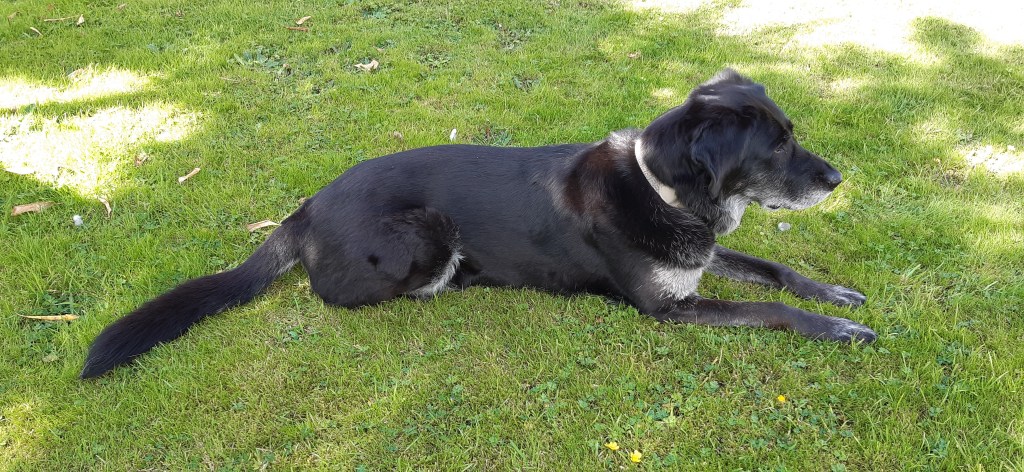While ambling along a quiet beach with my husband near our home, our attention was caught by a water skier in the distance. As we stood watching him zip at high speed across the bay, we were interrupted by a gentle nuzzling at our legs. My husband and I were being greeted by a youngish black Labrador who then stood stock still, gazing up at us. Although we recognise many dogs in our area, we hadn’t seen this fine-looking companion before. Given his keenness to make our acquaintance, we said hello and patted him, trying to discern his message, before a woman arrived and apologised. No need, we said. The woman explained that the dog had – er – prematurely left Guide Dogs’ puppy school due to his – um – free spirit. We couldn’t help but laugh. Upon our asking, the woman described a straightforward-sounding application process for rehoming a free-spirited puppy pupils or dogs retiring from service.
The woman explained that the dog had – er – prematurely left Guide Dogs’ puppy school due to its – um – free spirit
Having considered rehoming a dog from a rescue centre for some months, we decided instead to apply to Guide Dogs. The process is a little like applying for a job – asking for an outline of our previous experience with dogs (a fair amount), our ages (60s), and occupations (semi-retired). Additionally, we were asked who lives in our home, including other pets (none), how long the dog might be left alone each day (hardly at all), for how long we would be prepared to walk the dog daily (an hour or more), and to provide a description and photos of our home and garden.
A telephone interview followed – an unscheduled call by a kind-sounding woman, a rehoming officer, lasting nearly an hour. We were told if we didn’t hear anything within six months, we’d have to re-apply if we still wanted to pursue our application. Apparently, retirees and puppy school non-graduates are in high demand; the waiting list is long.
The months passed without any news. We started to envisage repeating the whole process when one day the rehoming officer phoned with news of a possible match. She described an eight-year-old early retiree whom the guided person, the partner, had been concerned was lame and limping. We were assured the vet had not found any physical problem. The officer said the dog had been removed from service, was now with fosterers, and ready to be rehomed permanently.
We agreed to meet in a car park. When the rehoming officer arrived, she opened her rear door and out sprang a lively, waggy-tailed black and grey cross between a Retriever and a German Shepherd. After brief introductions, we strode into the nextdoor field where the dog, masquerading as a vivacious puppy, played and ran and fetched and bounded about until she eventually plonked herself down on the warm grass, understandably puffing a little. She gazed with some puzzlement at these strangers who seemed so keen to play games with her. Lame? Um – not that we could detect. Limping? Unable to discern from the speed of the racing and bounding about. No, all we could see was a vigorous creature delighting at the chance for some serious play.
Two days later, and after a three-and-a-half-hour car journey, the dog was home with us. Our creaky 1920s bungalow and garden were raced around, sniffed, assessed, and registered in under five minutes. A month on, we sometimes affectionately refer to her as ‘the bear’ or just ‘Teddy’, after a friend to whom we’d sent a photo said she looked like a bear. The photos we’d initially been sent belied her actual size. The large dog bed we already had has returned to the loft, replaced – with considerable furniture reshuffling – by a new, extra-extra-large bed.
We’re learning what she likes, dislikes, and finds irresistible. Topping the irresistible list is the pull of the sea or, rather, the pull to the sea, with the promise of galloping along the beach and splashing about with the sort of abandon that makes us feel pretty feeble. But then we don’t have the advantage of a thick, natural wet suit. Leaving the beach probably tops the dislikes list.

And she comes with a fringe benefit – an intruder-alert system producing a roaring, thunderous bark activated when a stranger approaches our front door. When either of us goes out, our return was initially met with these roaring barks, time and familiarity now replacing them with a joyous, enchanting sound – a cross between crooning and crying.
And my husband and I are taken for something of a power walk, four or five miles daily. After pneumonia and pleurisy last December and repeated chest infections this year with some annoying, residual respiratory mischief, such a daily megadose of fresh air and exercise is, though gruelling, an unexpected tonic for my breathing apparatus.
Our amusing, intelligent, sensitive, gentle, loyal, and loving chum seems invigorated by her retirement, as are we. So, thanks not only to Guide Dogs but to that defiant black Labrador who nudged us in their direction all those months ago. One day the two might meet and, in cryptic canine language, share memorable tales of discontinuing puppy school and the fun of early retirement.








Comments